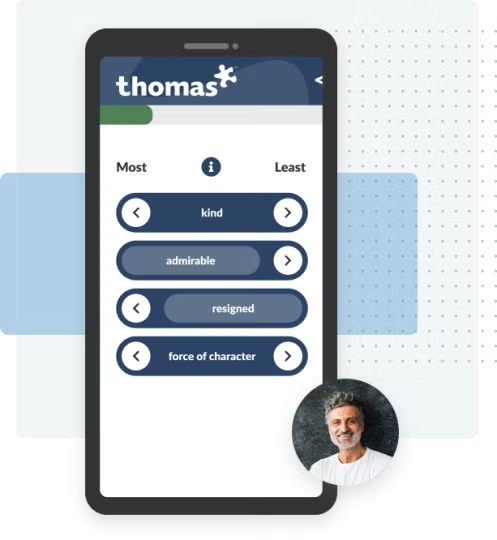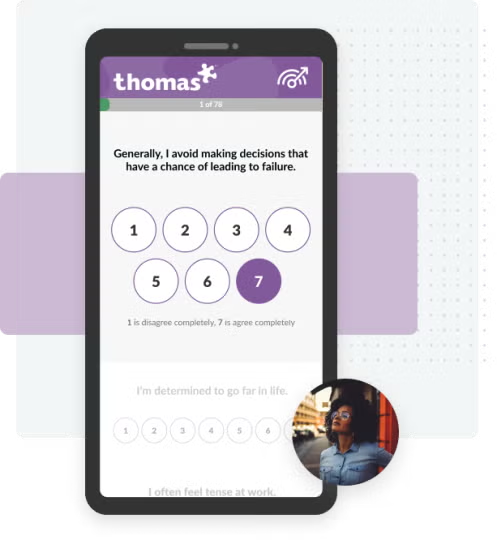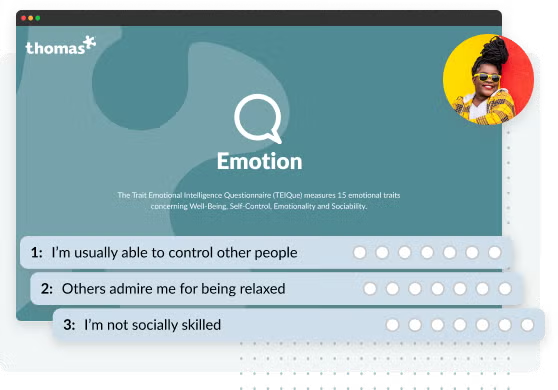Thomas Assessment Guides for Candidates
Whether you are taking a Thomas assessment as part of a recruitment process or for your own personal or professional development, we want to help you feel prepared.

Completing a Thomas assessment
By having a good understanding of the assessment and what to expect, you are more likely to perform at your best and have more confidence when completing other assessments in future. As you prepare to complete your psychometric assessment, remember this is an opportunity to gain valuable insights into your strengths, preferences, and potential areas for growth.

Thomas' Behavior assessment
The Thomas Behavior assessment, also known as the Personal Profile Analysis (PPA), evaluates how a person prefers to behave and communicate in the workplace.
Background & Theory
Dr. Thomas Hendrickson adapted William Moulton Marston’s DISC theory to create the Thomas Behavior assessment (PPA) in 1958, designed specifically for workplace settings. Marston's theory of human behavior (1928, 1931) proposes that our behavior is shaped by how comfortable we feel in different situations and how motivated we are to influence those situations. This framework identifies four key behavioral factors: Dominance, Influence, Steadiness, and Compliance. These factors form a matrix that reveals a person's typical interaction patterns. The assessment highlights personal behavioral preferences—there is no "ideal" style, as individuals naturally favor certain approaches over others.

Assessment Instructions
- There is no "correct" behavioral style. The assessment measures your natural preferences, so you cannot pass or fail.
- Your first response is usually the most accurate. Be spontaneous and truthful when answering.
- Completing the assessment without interruptions helps you focus. Although it is not timed, the assessment typically takes about 8 minutes.
- Base your answers on how you behave in your current job or most recent professional role. If you don’t have professional experience, answer based on your behavior at home.
Throughout the assessment, you will be presented with sets of four words. For each set, choose the word or phrase that most describes how you operate in your current job and the one that least describes you.
Some questions may be challenging to answer if all or none of the words resonate with you. These questions help capture the subtleties of your behavior, so it’s important to select the words that best reflect you.

Thomas' Aptitude assessment
The Thomas Aptitude assessment measures an individual's ability to quickly learn, process, and retain new skills and information.
Background & Theory
Developed by Dr. Peter Dann in 2022, this assessment is grounded in research reviewed by the American Psychological Association (Frank L. Schmidt & Jon E. Hunter, 1998), which analyzed 85 years of data. The findings showed that higher cognitive ability, or aptitude, as measured by the Thomas Aptitude assessment, is directly linked to improved employee productivity and performance. This tool provides an objective evaluation of a person’s capabilities, regardless of their qualifications or experience.
Assessment Instructions
- The assessment is timed, so completing it as quickly and accurately as possible is important.
- Complete the assessment in a quiet, distraction-free environment.
- The assessment consists of 5 sub-tests, each lasting between 2 to 5 minutes.
- Including instructions and practice examples, the assessment takes 30-45 minutes to complete.
- For best results, complete the assessment in one sitting.
- We strongly recommend reading the Aptitude Example Booklet below for more information on the types of questions you'll encounter.
- If you are aware of any factors that could affect your ability to complete the assessment, please inform the person who asked you to take it.

Technical Requirements
Before starting the assessment, you will need to set up your:
- Device: Use a desktop computer or laptop (PC or Mac) as the assessment will not run on mobile devices such as tablets or smartphones.
- Browser: Ensure you're using the latest version of your chosen web browser (Mozilla Firefox, Microsoft Edge, Google Chrome, or Safari). The assessment does not support Internet Explorer 11 or earlier versions.
- Background programs: Close any programs running in the background. Make sure pop-up windows and JavaScript are enabled.
- Network environment: It’s best to avoid completing the assessment at work, as some security settings may interfere with or block the assessment. We recommend using your home PC or Mac.
- Internet connectivity: The assessment will not be disrupted by internet connection issues, as all parts are loaded before it begins. No additional downloads occur during the assessment.
If the assessment is not functioning properly, try the following steps:
- Switch to a different web browser.
- Try using another computer.
If you continue to experience issues, consider these additional troubleshooting tips:
- For Google Chrome or Mozilla Firefox users: Turn on Chrome’s Incognito mode or Firefox’s Private Window to prevent browser extensions from interfering with the assessment.
- Temporarily disable any ad-blocking extensions.

Thomas' Personality assessment
The Thomas Personality assessment, also known as the High Potential Trait Indicator (HPTI), examines an individual’s personality traits and offers insights into how they work and interact with others.
Background & Theory
Developed by Ian MacRae and Adrian Furnham at University College London (UCL) and High Potential Psychology Ltd in 2016, the HPTI is based on a trait model of personality. This model places individuals along a continuum of stable personality factors. Different points on this continuum indicate the presence or absence of thoughts and behaviors that define each trait. Certain levels of these traits can suggest a high potential for success or, conversely, the risk of traits that might derail success. Drawing from contemporary personality psychology, including the Big Five Model, the assessment focuses on traits most predictive of workplace performance. Research demonstrates that different personality trait levels are linked to success in various roles, making it a valuable tool for measuring workplace personality.

Assessment Instructions
- There are no right or wrong answers, and you cannot pass or fail the assessment.
- The assessment is untimed; however, it typically takes around 8-10 minutes to complete.
- Try not to overthink the meaning of each statement. Be spontaneous and honest in your responses.
- Completing the assessment in a quiet, interruption-free environment helps with focus.
Throughout the assessment, you will be presented with 78 statements, and you’ll need to indicate how much you agree with each one on a scale from 1 (disagree completely) to 7 (agree completely).

Thomas' Emotional Intelligence assessment
Thomas’ Emotional Intelligence psychometric test, known as the Trait Emotional Intelligence Questionnaire (TEIQue), evaluates an individual's ability to understand and manage their own emotions and recognize and influence the emotions of others.
Background & Theory
Developed and continuously refined by Dr. K.V. Petrides at the London Psychometric Laboratory, based at University College London (UCL), this assessment is grounded in Petrides' trait emotional intelligence (trait EI) theory. Trait EI views emotional intelligence as a set of emotional self-perceptions tied to personality. It provides a comprehensive look at the emotional aspects of personality, offering insights into how individuals prefer to work and interact with others—making it a valuable tool in workplace settings.

Assessment Instructions
- There are no right or wrong answers, and you cannot pass or fail the assessment.
- The assessment is untimed; however it takes around 20 minutes to complete.
- Your first, instinctive response is typically the most accurate, so it’s best to answer honestly and spontaneously.
- We recommend completing the assessment in a quiet, distraction-free environment to help you stay focused.
Throughout the assessment, you will be presented with 153 statements and asked to respond on a scale from 1 (completely disagree) to 7 (completely agree).
For those seeking a quicker overview, the shorter version of the test, the Trait Emotional Intelligence Questionnaire-Short Form (TEIQue-SF), consists of 30 statements and follows the same guidelines, offering a snapshot of a person’s overall emotional intelligence.
Frequently Asked Questions
What are psychometric assessments?
Psychometric assessments are measures developed from validated psychological theories explaining specific elements of human functioning. They objectively and scientifically measure specific aspects of a person, and are often used to challenge subjective feelings, opinions, and biases. Such assessments provide in-depth, objective insights into the underlying aspects of a person, such as behavioral preferences, personality traits, and abilities. At Thomas, our assessments are based on strong, highly validated psychological science and over 40 years of academic and applied research.
What are psychometric assessments used for?
Psychometric assessments can be used across business, education and sport settings to address an array of people decisions. Commonly, they are used to recruit new individuals, identify individuals with the potential to be developed in specific areas, to increase team cohesion, provide career advice, coach individuals in attaining personal or professional goals, and to optimize organizational structure.
What makes a good psychometric assessment?
Good psychometric assessments are valid, reliable and fair. A valid assessment can be shown to measure what it says it does, and to be related to workplace outcomes such as performance or engagement. A reliable assessment can be shown to be accurate, i.e., if you completed it twice you would get very similar results. A fair assessment can be shown not to adversely impact any group of people. Thomas assessments are independently audited by the British Psychological Society (amongst other international bodies) to ensure we meet their strict criteria.
What influence do the assessment results have on hiring decisions?
Assessments are designed to be used in conjunction with other elements of the recruitment process, such as interviews, references, work simulation activities, etc. They objectively and scientifically measure specific aspects of a person and are often used to challenge subjective feelings, opinions, and biases. However, assessments are just one piece of the puzzle when getting to understand a person.


